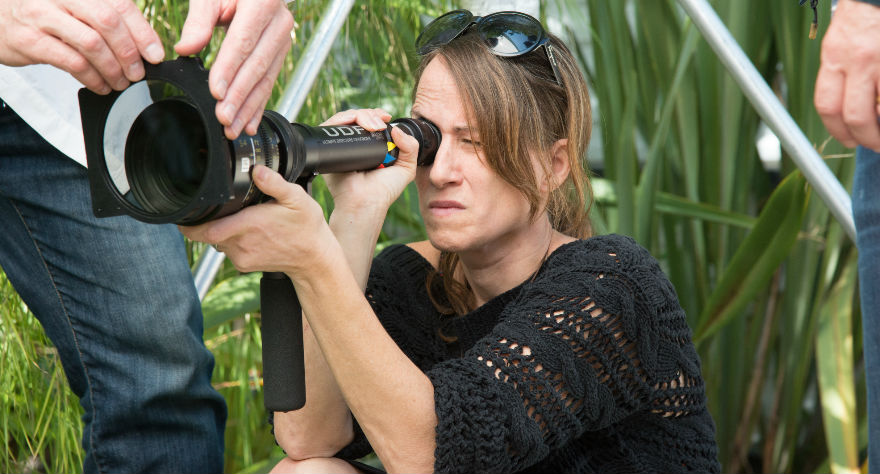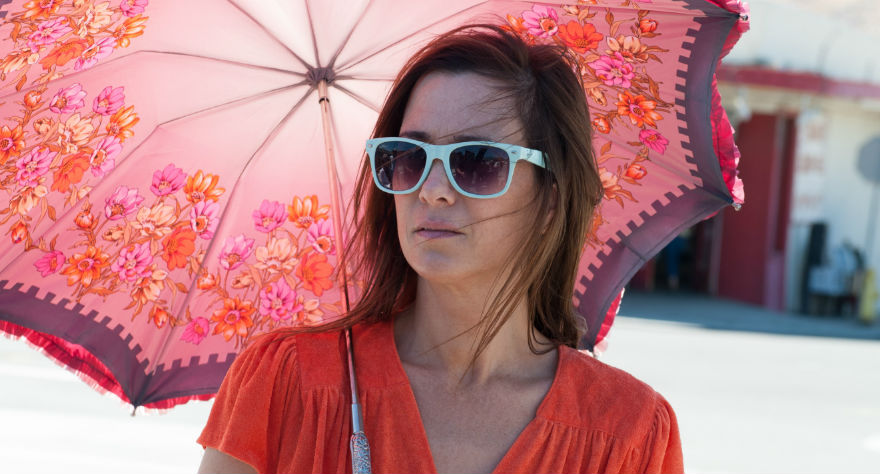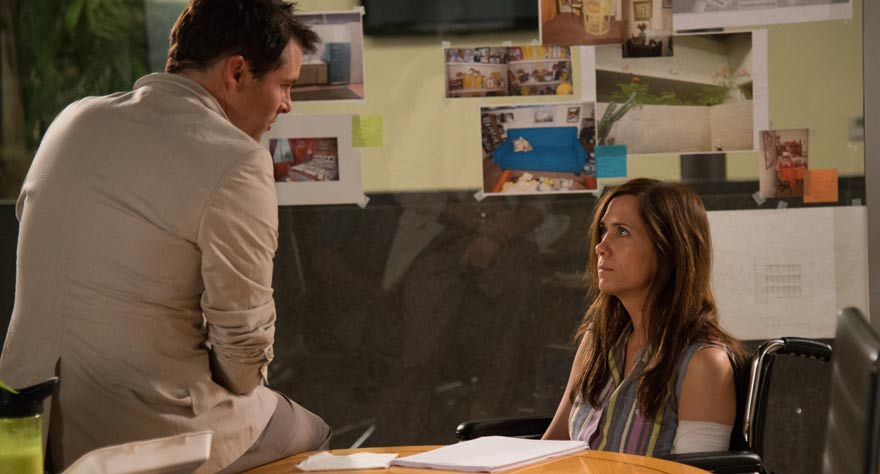Shira Piven On Kristen Wiig and Portraying Mental Illness With Dignity

With Welcome to Me, director Shira Piven and star Kristen Wiig ride a fine line. It’s a depiction of mental illness that manages to make you laugh without ever being offensive, and it’s by far Wiig’s most thought-provoking performance to date. She plays Alice Klieg, a small-town woman obsessed with television and showbiz (she worships Oprah on a daily basis on VHS tapes she’s memorized word for word). When she wins 85 million bucks in a lottery, she grabs her dream by the throat, throwing oodles of cash at a local broadcast company to produce and beam out her very own show, “Welcome to Me.” She’s mentally unstable, though, and when she quits her psychiatric meds, she begins to wobble off the rails, a full-on train wreck surely on her horizon.
In her sophomore feature, Piven’s crafted a film that’s deceptively elegant in its earnestness; a comedy on the surface, a piercing observation piece at its core. In a press roundtable interview, I spoke to Piven about the film’s subtleties, Wiig’s performance, and the tricky business of portraying mental illness on-screen.

Mental illness are stigmatized in society. How did that affect your approach?
If your main character is mentally ill, you have to tread lightly and very sensitively. For me, there are two things that come to mind. One is, it’s important to separate the person from the diagnosis. Two, [you have to be] really respectful and never laugh at the mental illness or the person, exactly. There’s a lot of humor in this movie, but me and Kristen felt that we want to laugh because the situation is absurd. Alice is a real person in a real world. I love her and I love the script because she’s someone who we recognize. I feel like we all know Alice, or we are Alice in some way. We have to give her dignity. I also think, on a social level, it’s more and more important that we become more open about mental illness, that it’s not stigmatized and marginalized.
I think we’re conditioned to accept portrayals of mental illness in movies a certain way. They’re often caricatures. Kristen doesn’t do that here, though, and I don’t think many other actors have the skill required to walk the fine line she does here.
Yeah, I think it really is a fine line. I sometimes like to call her performances a little bit death-defying, like a high-wire act. But it’s also how we cut the performance together in the edit room; creating a performance for film is a tricky business, and it’s a collaboration between the writer, the performer and the director. I feel like if you take all the things I said into account of being respectful of the mental illness and treating the script with sensitivity and allowing the actress to be who she is, hopefully the collision of those things will come out well. I think it’s so funny at moments—Alice is hilarious—but she doesn’t know she’s hilarious. She’s just living her life. We laugh in recognition.
For me, it was important to cast an actress with a basic comic center. I feel like she lives and breathes in that comic center, but she also has a vulnerable side. She can go to those dark places, darker than I imagined she could as an actress.
Darker than you intended?
Not intended, but she goes to places in this movie she’s never gone before. So I’m not gonna say, “Could you audition for me and show me that you can go there?” She did it so honestly and beautifully.
Was Kristen in mind for the character?
The script wasn’t written with her in mind, but she was my first choice. There were a lot of ideas floating around for actresses, and initially I thought a lot about Joan Cusack. She was kind of a muse for this character in my mind. I think Joan and Kristen have similar sensibilities. There was a boardroom scene where Joan Cusack, Kristen Wiig, Jennifer Jason Leigh, Wes Bentley and James Marsden are all together, and it was really fun. They were excited to work together.
I like that Alice has a distinct look: her fanny pack, the way her apartment is decorated. When did that vision come together?
The fanny pack was in the script, but I had this vision of how she should look. Kristen and I agreed on the heart of the character, but we didn’t necessarily agree on how she looked at first. I think Kristen thought Alice would look a little more realistic and plain, and I felt Alice was a little bit of a heightened character. I didn’t want her to play her in a heightened way, but I saw her in colorful dresses that might be from the ’40s or the ’50s. I felt like she shopped in thrift stores. The costume designer, Susan Matheson, agreed with me. “She would shop in Palm Desert thrift stores! She’s a desert flower!” She came up with this orange terrycloth dress. Kristen was eventually won over by these ideas and embraced them.
Something that came to mind for me was that a personality like Alice wouldn’t need a cent of that 85 million dollars to be successful on Youtube. Was that in mind for the movie’s ending?
Yes, in a way. It’s funny, we found some interesting people on Youtube when we were in pre-production. There are some amazing Youtubers going off in a similar way to Alice. I hate to talk about the end of the movie because it’s so open to interpretation, but it goes back to James Marsden’s line when he says, “She wants to be televised.” And Gabe (Bentley) knows she’s found this form of expression, as narcissistic as it might be, so he gives her a camera.
I read that this was originally a TV pilot.
I think Eliot Laurence (the screenwriter) was hoping for it to be a Showtime or HBO series, but when I read it, I felt I was reading a screenplay. I felt obsessed with it being a movie. I didn’t even know if I was giving him good advice or not, but I said, “Would you like to rewrite this as a screenplay?” He was thrilled with the idea.
Could you talk about what it was like shooting the dog neutering scene?
The dog neutering was a little like life imitating art. We had a lot of meetings about dog neutering. [laughs] It was some big conundrum of how to do this. We had a vet tech on set who was advising us and brilliant prop people. The prop people got these amazing props that looked incredibly real, and Kristen had these delicate hands; she really did the surgery. The surgery looked really good, but at one point we had the vet tech—who had similar hands, amazingly—come in and do some of the really exacting surgical stuff. We had some taxidermy dogs we filmed. The dog wrangler, who was fantastic, said she could get Alice’s dog to play dead on the table, and she did!

I’ve been asking everybody about this because I’m kind of obsessed: I think not enough attention is given to actors who act with their bodies. When you see Academy Awards clips, they always show actors yelling in a small room, or crying. Kristen tells stories with her body very well. Can you talk about her physical performance?
That’s cool! Such a great observation. I love it. I come from a theater background, and on stage you can’t just be a talking head. Really good actresses have intense physical training. She’s very in her body. Even in the first scene when she’s watching Oprah, you can see her just leaning into the TV. One of my favorite physical moments was a scene where she’s listening to her theme song. She’s supposed to just be lying around, listening, but I thought it would be really great if she did that dancing we do when we’re alone in our apartment. I thought Kristen would be great at that. That was just delightful.
I think it’s really haunting the way she walks through the casino in that pivotal scene.
That’s an even better example, because she’s not doing movement, per se, but just owning the space she’s in in an incredible way.
Before Alice wins the money, she has a very scheduled existence. After she wins the money, she throws all that to the wind. Part of it has to do with the meds, but what about the money made her throw away her routine?
That’s where the teeny hint of fairy tale comes in. She has this lonely life, going to a convenience store to get her pudding and issue of O magazine. I think Alice is someone who fantasized about what she’d do when her ship came in. Her ship comes in, and she just goes for it, takes that leap off the bridge. Her apartment is still there, with her sleeping bag and the whole thing, but I think she takes that leap of faith. That’s what makes it a great story, in a way, because we all fantasize about that leap of faith, and she does it. She inspires people around her, and I think Gabe sees her just going whole-hog for what she’s going to do. Even though everyone’s trying to stop her and she unravels and it’s a big mess, it says something about the dangers of following that narcissistic path, but she’s also inspiring at the same time.
Was there any improvisation involved in the film?
There was a lot of improvisation. We definitely shot the script and got everything we wanted from the script. We didn’t use whole new setups for the improvisation, but we used the setups we were in and had them riff within it. I would throw lines or ideas out for an alternate moment, and Elliot would sometimes hand rewrites to Kristen. She trusted him so much because she really loved the writing. I think her prepared statement in the casino was one of those alternate takes he wrote on the fly. She and Tim Robbins improvised the banana moment.
Joan Cusack has one of my favorite movie voices of all time. I could listen to her talk all day. Tim Robbins, too. I love the way Joan says “baby” to Alice in studio.
I’ve known Tim since I was 24 years old and I’ve known Joan since we were 8 years old. They’re both kind of heroes of mine. They’re friends, but they’re both people who I creatively admire so much.
Do you think Alice and Gabe’s relationship goes anywhere?
I think people like Alice with borderline personality disorder who have relationships…they have to have a devoted partner. It’s an unpredictable roller coaster, and I think Gabe is limited in his own way. I think they’ve found a match in each other, but it’s always hard to say how it’s going to turn out. One of the great lines is when Gabe says, “I’ve been divorced twice. And by twice I mean three times.” We hope for them.
